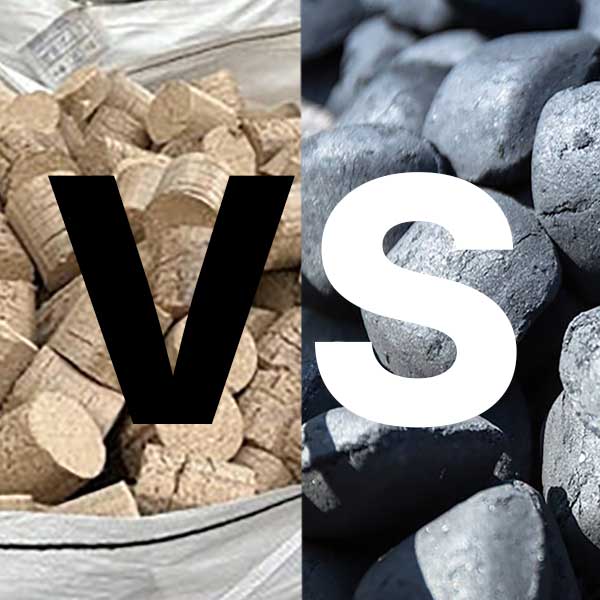As we strive to make more eco-conscious choices in our daily lives, the importance of choosing the right type of fuel becomes evident. Briquettes, made from compressed biomass, have been gaining traction as an alternative to traditional fuels like coal and wood. But how do they measure up when it comes to efficiency, environmental impact, and overall value? In this post, we’ll compare briquettes made by a briquette machine vs coal and wood, and explain why they’re an excellent choice for anyone looking to make the switch to a more sustainable fuel option.

What Are Briquettes?
Briquettes are compact blocks of compressed biomass materials such as sawdust, wood chips, agricultural waste, or even paper. The process of making briquettes involves a briquette machine, which compresses the raw material under high pressure, creating a solid fuel that burns cleaner and more efficiently than traditional alternatives.
Briquettes vs Coal: Cleaner, Greener, and More Efficient
When comparing briquettes to coal, the most significant difference is in their environmental impact. Here are some of the ways briquettes come out on top:
1. Reduced Carbon Emissions
Coal is a fossil fuel that releases a significant amount of carbon dioxide (CO2) and other harmful gases when burned. In contrast, briquettes made from renewable biomass materials produce far fewer emissions. This makes briquettes a more eco-friendly fuel option for those looking to reduce their carbon footprint and contribute to cleaner air.
2. Sustainability
Coal mining can have devastating effects on the environment, including habitat destruction, water contamination, and air pollution. Additionally, coal is a non-renewable resource, meaning it will eventually run out. Briquettes, on the other hand, are made from waste materials that would otherwise be discarded, turning them into a useful and sustainable fuel source. By using briquettes, you’re supporting the circular economy and reducing waste.
3. Efficient Burning
Briquettes are denser and have a higher calorific value than coal, meaning they produce more heat per unit of fuel. This makes briquettes an efficient choice for heating and cooking, as they provide more heat for less fuel. Vs coal, by contrast, tends to burn less efficiently, leaving behind more ash and waste.
4. Safer to Handle
Coal contains impurities like sulfur and ash that can be harmful to human health when inhaled or touched. Briquettes, on the other hand, are made from compressed organic matter and are generally safer to handle. They burn cleaner, with minimal smoke and fewer harmful pollutants, making them a healthier option for both you and the environment.
Briquettes vs Wood: Cleaner, More Consistent Fuel
While wood has long been a popular choice for heating and cooking, briquettes have several advantages over traditional logs:
1. Lower Moisture Content
Wood needs to be properly seasoned before it can be burned, as it contains a high moisture content that reduces its efficiency. Briquettes, on the other hand, are made from dry materials, meaning they burn more efficiently and produce less smoke. This makes briquettes an ideal choice for consistent heat production without the hassle of drying or seasoning wood.
2. Longer Burn Time
Because briquettes are denser and have a more consistent shape, they burn for a longer time than wood logs. This means you need less fuel to achieve the same amount of heat, making briquettes a more economical option. With wood, you might need to continually add logs to maintain a steady fire, whereas briquettes provide a longer, more consistent burn.
3. Less Mess
Using wood can create a significant amount of mess in your fireplace or stove, with bark and debris often falling onto the floor. Briquettes, however, produce much less mess. They are uniform in shape, and their compact design ensures less spillage and cleaner storage.
4. Easier Storage and Handling
Briquettes are easier to store and handle compared to wood logs. They take up less space and are more uniform in size, making them ideal for smaller storage spaces. Additionally, their compressed nature means they are lighter than large, bulky logs, making them easier to carry and manage.
Briquettes vs Coal: Cost-Effective and Convenient Fuel
In addition to their environmental and performance benefits, briquettes offer excellent value for money. While the upfront cost of a briquette machine might seem high, the long-term savings are significant. Since briquettes burn more efficiently, you’ll use less fuel, reducing your heating costs over time. Plus, as they are made from waste materials, they are often cheaper to produce, meaning briquettes can be a cost-effective alternative to coal or wood.
Briquettes vs Coal Conclusion: Why Briquettes are the Fuel of the Future
Briquettes made by a briquette machine offer a cleaner, more sustainable, and efficient alternative to both coal and wood. They provide higher calorific value, fewer emissions, and better overall performance. Whether you’re looking to reduce your environmental impact, save money on heating, or simply enjoy a cleaner burn, briquettes are an excellent choice for anyone considering a change in their fuel source.
By making the switch to briquettes, you’re not only benefiting from a superior fuel but also supporting sustainable practices that contribute to a greener future. So, the next time you’re considering your heating fuel options, remember: briquettes are the smart, eco-friendly choice.
IWMachines.co.uk – Your No. 1 source for Briquette Machines and other woodworking machines.


